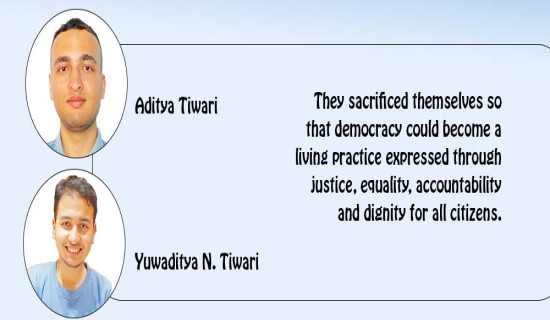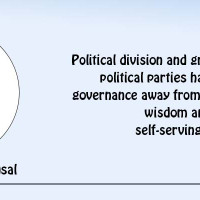- Friday, 30 January 2026
End Violence In Healthcare Institutions
Violence against healthcare workers has become a pressing issue that demands immediate attention in Nepal. In recent years, there has been a disturbing rise in violence against healthcare workers worldwide. These dedicated professionals, who work tirelessly to save lives and provide essential care, are increasingly becoming victims of physical and verbal abuse. Violence in healthcare settings is a distressing and alarming issue that affects both healthcare workers and patients.
This trend not only jeopardises the well-being of healthcare workers but also undermines the quality of patient care. It is high time we addressed this issue and took concrete steps to ensure the safety and security of those who dedicate their lives to healing others. Healthcare workers are at the forefront of patient care, and their safety is crucial for the effective delivery of health services. They have a responsibility to advocate for their own safety and well-being, as well as that of their colleagues and patients. This includes reporting incidents of violence, implementing preventive measures, and participating in training programmes to handle violent situations effectively.
Challenges
Healthcare workers, including doctors, pharmacists, nurses, co-medicals, and support staff, face an array of challenges in their daily work. From long hours to high-stress situations, they are already burdened with immense responsibilities. However, the added threat of violence further compounds their acquired difficulties owing to burn-out effects. According to a report by the World Health Organisation (WHO), one in eight healthcare workers experiences physical violence at some point in their careers. Verbal abuse is even more prevalent, affecting a staggering two-thirds of healthcare professionals.
In order to combat violence in healthcare settings, it is crucial to identify its root causes. Several factors contribute to the rising violence against healthcare workers in Nepal's healthcare system. Firstly, the lack of awareness and education among patients and their families regarding healthcare rights results inappropriate behaviour in healthcare settings. Additionally, inadequate infrastructure, long waiting times, inadequate staffing levels, a lack of security measures, and limited resources in healthcare facilities contribute to patient frustration, which can escalate into violence. Furthermore, the absence of strict legal consequences for perpetrators of violence further perpetuates this issue.
The consequences of violence are far-reaching. Physical and verbal assaults not only cause physical harm but also have long-lasting psychological effects and also compromise patient care and erode trust in the healthcare system. Healthcare professionals often experience anxiety, depression, and post-traumatic stress disorder due to these traumatic incidents. Moreover, violence creates a hostile work environment, leading to decreased job satisfaction, burnout, and ultimately, a high turnover rate among healthcare workers. The exodus of skilled professionals further exacerbates the already overstretched healthcare system.
Violence in healthcare settings not only affects healthcare workers but also compromises patient care and safety. Fear of violence may deter patients from seeking timely medical attention, leading to delayed diagnoses and treatment. Moreover, healthcare professionals working in a hostile environment are less likely to provide quality care, as their focus shifts from patient well-being to self-preservation. Consequently, the overall healthcare system suffers, resulting in decreased patient satisfaction and trust in the healthcare system.
The responsibility to address and eliminate this problem lies not only with healthcare workers but also with the general public. By recognising the shared responsibility, we can work towards creating a safe and secure environment for everyone involved. Firstly, governments and healthcare institutions must prioritize the safety of their workers by implementing comprehensive security measures. Additionally, strict laws and penalties should be enacted to deter potential offenders and ensure accountability for acts of violence.
Education and awareness campaigns are equally crucial in changing societal attitudes toward healthcare workers. By highlighting the invaluable contributions of these professionals and emphasizing the importance of respectful behavior, we can foster a culture of appreciation and support. Implementing comprehensive educational programs to raise awareness among patients, their families, and healthcare workers about healthcare rights, appropriate behavior, and the consequences of violence plays a vital role. This can be achieved through public campaigns, workshops, and training sessions. Secondly, investing in improving healthcare infrastructure, ensuring adequate resources, and reducing waiting times can be vital. This will help alleviate patient frustration and minimise the triggers for violence.
Shared responsibility
Equally important is to establish support systems and counseling services for healthcare workers who have experienced violence. These services can provide psychological support, help in coping with trauma, and reduce the long-term impact of violence. Addressing violence in healthcare settings requires collaboration between healthcare workers, institutions, policymakers, and the general public. Institutions should establish comprehensive policies and protocols to prevent and respond to violence effectively. Adequate resources, such as security personnel, and surveillance systems, should be provided to ensure the safety of healthcare workers and patients. Policymakers should prioritise the issue of violence in healthcare settings and allocate sufficient funding for research, training, and prevention programmes.
They should also enact legislation that holds perpetrators accountable for their actions and provides legal protection to healthcare workers. Ending violence in healthcare settings in Nepal is an urgent priority that requires a multi-faceted approach. By addressing the root causes, raising awareness, strengthening the legal framework, improving infrastructure, and providing support services, we can create a safer environment for healthcare workers and patients alike. Therefore, the government, healthcare organisations, and society as a whole should collaborate and take immediate action to ensure the well-being of healthcare workers.
Only through collective action can we put an end to this epidemic of violence and ensure that those who care for us are cared for in return. Together, we can ensure that healthcare settings remain places of healing, compassion, and safety for all. By fostering an environment that values open communication, empathy, and understanding, we can help prevent conflicts from escalating into violent incidents.
(Dr. Lohani is the clinical director at the Nepal Drug and Poison Information Centre. lohanis@gmail.com)

















